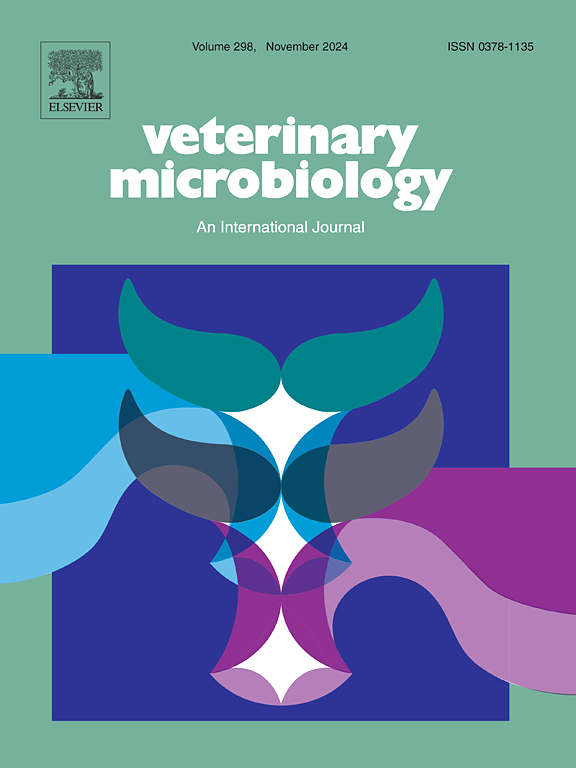Efficacy of a DNA vaccine encoding the E2 glycoprotein of bovine viral diarrhea virus 1 fused to mouse lysosome-associated membrane protein 1
IF 2.4
2区 农林科学
Q3 MICROBIOLOGY
引用次数: 0
Abstract
The E2 protein of bovine viral diarrhea virus (BVDV) is a known protective antigen and a major target for DNA vaccines. DNA vaccines have various advantages; however, their immunogenicity needs to be enhanced by using adjuvants or drug delivery systems. In this study, we used mouse lysosome-associated membrane protein 1 (mLAMP1) as a molecular adjuvant and developed a DNA vaccine encoding an mLAMP1-BVDV E2 chimeric protein (pVax-mLAMP1-E2). We constructed DNA plasmids in which the E2 gene was inserted within the hinge region (H) or membrane proximal domain (D) of the mLAMP1 gene. Transfection of these plasmids into cultured cells led to high expression of E2 antigen from pVax-mLAMP1-E2 (H). Intradermal immunization of mice with pVax-mLAMP1-E2 (H) induced sufficient neutralizing antibodies and splenocytes with E2 antigen-specific IFN-γ production compared with pVax-mLAMP1-E2 (D). However, the immunogenicity of pVax mLAMP1-E2 (H) in mice did not differ from that of a control plasmid without the LAMP1 molecule (pVax-E2). In cattle, geometric mean serum neutralizing antibody titers after intradermal or intramuscular injection tended to be higher with pVax-mLAMP1-E2 (H) than with pVax that expressed E2 without mLAMP1. In addition, E2 antigen-specific IFN-γ production in peripheral blood mononuclear cells from cattle immunized intradermally with pVax-mLAMP1-E2 (H) was not significantly different from that of pVax-E2. These results suggest that mLAMP1 fusion antigens effectively induce humoral and cellular immunity in mice and cattle, especially when the antigen is inserted in the hinge region of mLAMP1. The LAMP1-E2 fusion antigen may be a useful candidate for a BVDV DNA vaccine in cattle.
编码与小鼠溶酶体相关膜蛋白 1 融合的牛病毒性腹泻病毒 1 的 E2 糖蛋白的 DNA 疫苗的功效。
牛病毒性腹泻病毒(BVDV)的 E2 蛋白是一种已知的保护性抗原,也是 DNA 疫苗的主要靶标。DNA 疫苗具有多种优势,但需要通过使用佐剂或给药系统来增强其免疫原性。在本研究中,我们使用小鼠溶酶体相关膜蛋白1(mLAMP1)作为分子佐剂,并开发了编码mLAMP1-BVDV E2嵌合蛋白的DNA疫苗(pVax-mLAMP1-E2)。我们构建了 DNA 质粒,将 E2 基因插入 mLAMP1 基因的铰链区(H)或膜近端结构域(D)。将这些质粒转染到培养细胞后,pVax-mLAMP1-E2(H)的E2抗原得到了高表达。与pVax-mLAMP1-E2(D)相比,用pVax-mLAMP1-E2(H)皮内免疫小鼠可诱导足够的中和抗体和脾细胞产生E2抗原特异性IFN-γ。然而,pVax mLAMP1-E2(H)在小鼠中的免疫原性与不含 LAMP1 分子的对照质粒(pVax-E2)没有区别。在牛身上,皮内或肌肉注射 pVax-mLAMP1-E2 (H) 后的几何平均血清中和抗体滴度往往高于表达 E2 而不表达 mLAMP1 的 pVax。此外,用 pVax-mLAMP1-E2 (H) 皮内免疫的牛的外周血单核细胞产生的 E2 抗原特异性 IFN-γ 与 pVax-E2 没有显著差异。这些结果表明,mLAMP1 融合抗原能有效诱导小鼠和牛的体液免疫和细胞免疫,尤其是当抗原插入 mLAMP1 的铰链区时。LAMP1-E2 融合抗原可能是牛 BVDV DNA 疫苗的有用候选抗原。
本文章由计算机程序翻译,如有差异,请以英文原文为准。
求助全文
约1分钟内获得全文
求助全文
来源期刊

Veterinary microbiology
农林科学-兽医学
CiteScore
5.90
自引率
6.10%
发文量
221
审稿时长
52 days
期刊介绍:
Veterinary Microbiology is concerned with microbial (bacterial, fungal, viral) diseases of domesticated vertebrate animals (livestock, companion animals, fur-bearing animals, game, poultry, fish) that supply food, other useful products or companionship. In addition, Microbial diseases of wild animals living in captivity, or as members of the feral fauna will also be considered if the infections are of interest because of their interrelation with humans (zoonoses) and/or domestic animals. Studies of antimicrobial resistance are also included, provided that the results represent a substantial advance in knowledge. Authors are strongly encouraged to read - prior to submission - the Editorials (''Scope or cope'' and ''Scope or cope II'') published previously in the journal. The Editors reserve the right to suggest submission to another journal for those papers which they feel would be more appropriate for consideration by that journal.
Original research papers of high quality and novelty on aspects of control, host response, molecular biology, pathogenesis, prevention, and treatment of microbial diseases of animals are published. Papers dealing primarily with immunology, epidemiology, molecular biology and antiviral or microbial agents will only be considered if they demonstrate a clear impact on a disease. Papers focusing solely on diagnostic techniques (such as another PCR protocol or ELISA) will not be published - focus should be on a microorganism and not on a particular technique. Papers only reporting microbial sequences, transcriptomics data, or proteomics data will not be considered unless the results represent a substantial advance in knowledge.
Drug trial papers will be considered if they have general application or significance. Papers on the identification of microorganisms will also be considered, but detailed taxonomic studies do not fall within the scope of the journal. Case reports will not be published, unless they have general application or contain novel aspects. Papers of geographically limited interest, which repeat what had been established elsewhere will not be considered. The readership of the journal is global.
 求助内容:
求助内容: 应助结果提醒方式:
应助结果提醒方式:


